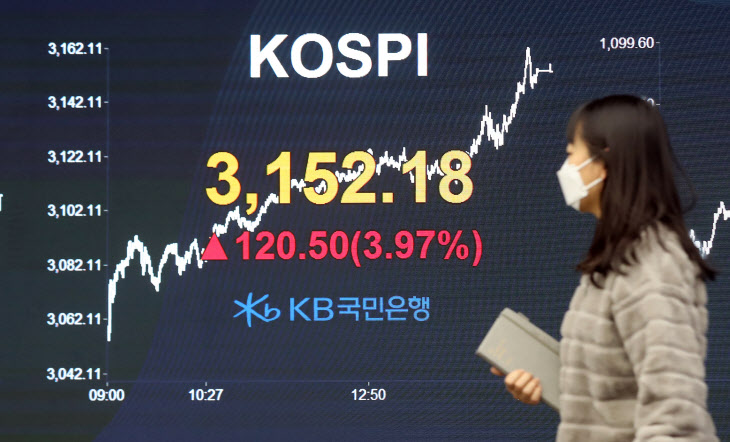 |
| On the 8th, the KOSPI recorded an all-time high of 3152.18. KB Kookmin Bank’s dealing room in Yeouido, Seoul, after the market. [연합뉴스] |
As the KOSPI surpassed 3000 and even 3100 without hesitation, a bubble controversy arose. The KOSPI recorded 3152.18 (3.97% compared to the previous day) on the 8th. It has risen for 10 consecutive weeks. The fast rising curve of the KOSPI was influenced by expectations of economic recovery at home and abroad and abundant market liquidity. Even taking this into account, concerns over overheating and bubbles emerge from the rapid rise.
Even looking at the indicators. The 12-month leading price-earnings ratio (PER) collected by F&Guide is 14.41x at the end of 2020. It is much higher than the long-term average of the domestic stock market, which is 10 times higher than that of the domestic stock market. A high PER means that the stock price is higher than the earnings per share.
The’Buffett Index’, which is divided by market capitalization by gross domestic product (GDP), also indicates overheating. Last year, Korea’s GDP, as estimated by the International Monetary Fund (IMF), was 1900 trillion won, and the KOSPI market capitalization as of the end of last year was 1,800 trillion won, with the Buffett index of 104.2%. If this index is 70~80%, it is considered undervalued, and if it exceeds 100%, it is judged as high. As of the 7th, the market capitalization of the KOSPI was 2086 trillion won.
Lee Kyung-min, head of investment strategy team at Daishin Securities, said, “There is a high possibility of a short-term correction (down) and it is time to take a break.” It is forecasted that the adjustment range from May to June could increase.”
However, it is pointed out that it is not the standard as the economic environment and structure have changed. With the domestic stock market being reorganized into a new industrial structure, the traditional leading industry, the financial industry, has significantly reduced its share of the total market capitalization to 7.6%. The semiconductor-centered electric and electronic sector accounts for 37.6%, leading the market. New industries such as IT and bio emerged here.
According to an analysis, the restructuring of the industry is a factor that can re-evaluate the KOSPI despite the controversy over the stock market’overheating’. Seo Cheol-soo, head of Mirae Asset Daewoo Research Center, said, “There are not only semiconductors, but also meaningful companies such as batteries, bio, and non-face-to-face. Compared to the past shipbuilding and steel industry, it is markedly different and improved.” Dae-hoon Han, a researcher at SK Securities, said, “There are no events that will affect the stock market. We reached 3000, which seemed high, but now we need to look higher with liquidity market ahead.”
Reporter Lee Sung-Young [email protected]
View other reporters’ articles>
